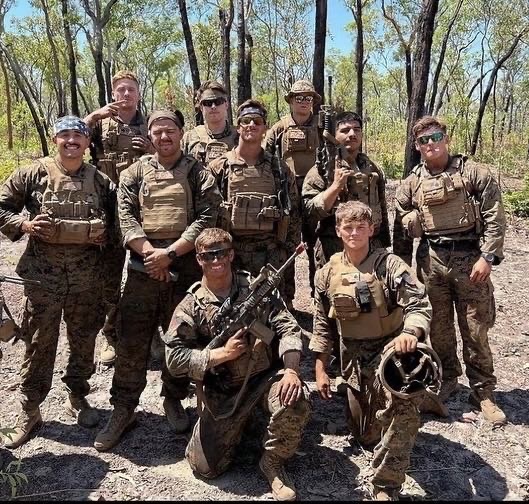Starving, Blistered Soul
photo via Nicholas Valdez.
Eberto Valdez, celebrating the birth of a niece and enjoying his time with family that eventually joined him in his migration, 15 years after first arriving in the United States of America
Trust is the first thing that is betrayed when moving to a new country. Convinced to move to the United States, Eberto Valdez watched his older brother get on a bus bound to Mexico and leave him behind in Azusa, California. It was 1991, and his calves were sore and his feet were tired from walking. He had no car and no place to live. He spoke no English and didn’t carry a single dollar: absolutely broke.
Eberto Valdez had just graduated high school the previous year, and shortly after he took his shot at a higher level of education. He was admitted into a university in Mexico, but he didn’t “follow through”, he said. “Mexico isn’t like the U.S. It’s harder. You may have the right grades but you can’t attend if you don’t have the funds.” After dropping out, his brother, Nel Valdez, suggested they move to the United States together in hopes of making more money. He didn’t think it through, he didn’t consider the culture shock, and he didn’t think twice about having to learn a new language. “I really wasn’t prepared to come. The question was ‘are you coming or not?’” Eberto said, “and at my age, every decision I made was for my family. That was the culture at the time.” People weren’t making more than five dollars a day in Mexico, and Eberto was anticipating that the United States could provide a better lifestyle for himself, but ultimately he hoped it would one day benefit his mother.
Due to the Immigration Reform and Control Act of 1986, signed into law by President Ronald Reagan, Nel and three million undocumented immigrants were granted amnesty in the United States, allowing them to work and travel freely between countries. Eberto, who hadn’t arrived in the United States until 1991, was not protected by this Act. He was an illegal immigrant, so when his brother left for Mexico he had no choice but stay behind in a country he found completely foreign. He recalls the first place he tried to stay at. It was his first month in California and he was told to head to an apartment building that was managed by one of his uncle’s friends, and that it may give him a free place to stay for a few weeks. He arrived expecting hospitality, but instead they greeted him with price tags. It was a three bedroom apartment that he was supposed to share with 9 other people, and they expected him to pay rent. “I didn’t have any money, really I had absolutely nothing. I wasn’t angry, but I was bummed out. The only thing I could feel was complete impotence, so I hit the road again,” Eberto remembers. “After that I would stay with some of Nel’s friends,” he notes, “sometimes with acquaintances, sometimes with relatives. I was bouncing around homes until I got my own place around four months after.”
Being an illegal immigrant he always had to be careful of where he was and what could happen if he stayed too long. “Era puro trabajar. Simply work and go home and that’s it. You were basically hiding from the law,” Eberto comments. When you first arrive in the States, it’s almost required to have two or three jobs. “It’s necessary if you want to independently sustain yourself,” he said, “and all immigrants go through the same thing.” Eberto stresses that first and foremost, the greatest struggle in a foreign country is always the language barrier. It was something he had no choice but to overcome. “I never liked earning minimum wage. Learning the language was a way to increase income,” he said.
However, Eberto also mentions a different culture shock not always mentioned by immigrants. In Mexico you are free to go out whenever you like, but that’s not the case in the United States. He recalls how in Mexico it’s entirely possible to go out and not spend absolutely any money, but in the U.S. it’s virtually impossible. “You’re absorbed by [American] consumerism. In Mexico you’re content with less.” Eberto went on to recount a story about how in Mexico a day at the beach with friends is fueled by meals prepared and packed at home, and although you may do that in the United States you always have to prepare to pay for a meal at some point.
The consumerism that has plagued new immigrants is reflected in the desperation that occurs when looking for jobs. In California and Arizona you may find groups of workers crowding the parking lots of Home Depot looking for work. Immigrants will get there early and wait in the blazing sun for the Foreman to come by in his pick-up truck, pick four or five of them at random, haul them up into the bed of the truck, and take them to work. Mobs of immigrants would flood to the pick-up truck as soon as it was within sight and shout at the Foreman hoping that it would increase their chances of being picked. The Foreman was usually a man in charge of a landscaping project in need of working hands. Immigrants were easy people to hire since they were cheap, but since they often had no legal documentation and couldn’t speak the language, the Foreman also had no obligation to pay them. Eberto Valdez found these landscaping projects to be his first job. “Sometimes they choose you and sometimes they don’t. I would usually get picked up by an older Mormon guy. He wouldn’t pay me great, but he was good,” Eberto recalls with a deep sigh. “And he was consistent.”
Eberto moved to Arizona in 1995. California had given him all that it could, but Eberto needed more. There were many immigrants like him, but what set him apart from the rest was his approach to work in the United States. “Are you working to better yourself, or are you working to accumulate?” Eberto saw how many of his coworkers would spiral and throw themselves into a materialistic world, but not him. His calves were sore and his feet were tired from working, but his spirit yearns. These were his starving, blistered soles.

Nicholas Valdez is a sophomore at Fitchburg State University and the managing editor for The Point. He is majoring in English Studies with a concentration...









